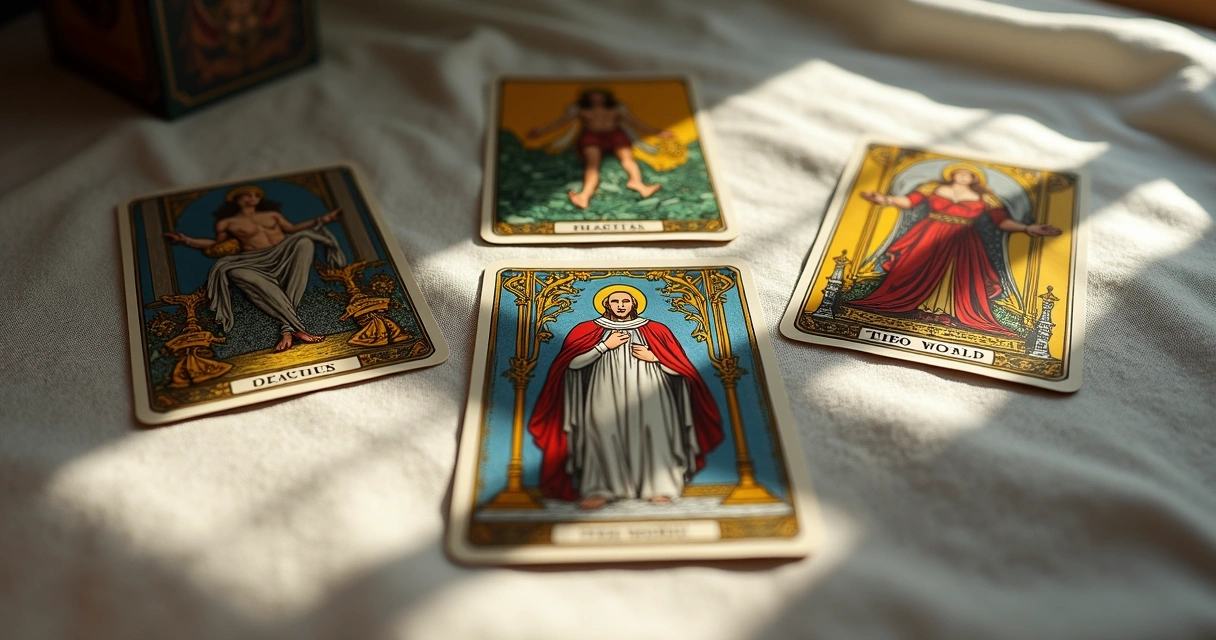The Judgement card sits near the completion of the Major Arcana, directly before The World. We have always found its presence to be striking—almost impossible to ignore in any spread. Unlike cards that suggest small changes or passing moods, Judgement delivers an invitation to stand at a threshold, to see both where we have been and where we are called to go. The energy is neither gentle nor harsh, but rather clear and unwavering, asking us to witness ourselves with honesty.
Core symbolism and visual story
Let’s begin with what we see: an angel, usually Gabriel, sounding a trumpet from the heavens. Below, figures rise from coffins, arms outstretched. The pale mountains in the distance and the banners in the sky lend a sense of awe—a kind of sacred announcement fills the scene. Everything about the imagery evokes interruption and awakening. There are no secrets here, just the clarity of a new day breaking open the old.
 The colors often lean toward cool blues, grays, and golden whites. These blend judgment with peace—illumination that does not burn, but clears. The presence of white (purity), red (passion), and blue (understanding) means the message is holistic; this is not only a call for intellect, but for heart and intuition too.
The colors often lean toward cool blues, grays, and golden whites. These blend judgment with peace—illumination that does not burn, but clears. The presence of white (purity), red (passion), and blue (understanding) means the message is holistic; this is not only a call for intellect, but for heart and intuition too.
Judgement’s numerology, 20, boils down to 2: reflection and partnership. It signals both a personal reckoning and a reminder that we are never alone on the journey. This card is a crossroads, echoing throughout our readings as a signal of transition and awakening—not always comfortable, rarely ever ignored.
Upright Judgement: awakening and self-assessment
When this card upright appears, we know a turning point is at hand. In our sessions and through MysticLog’s AI assistant, Judgement repeatedly points to the need for sincere self-evaluation. It’s a call to pause, look back, accept what is learned, and then let it shape what comes next.
General meaning in upright
Upright Judgement marks a time of awakening, inner calling, and honest review of past actions and choices. Old cycles wind down. What have we learned from them? Are we prepared to forgive ourselves for past missteps? Renewal only follows when we face our history without denial. This card offers a powerful prompt: What truth have we avoided, and can we now finally accept it?
Listen for the call, even if it disrupts comfort.
Upright Judgement in love
Relationships under this influence may experience reckoning. We often notice questions around moving forward or closure. Sometimes, this means a second chance in love—reconciling, releasing, or radically redefining bonds. More often, it’s about honesty: facing patterns, discussing old wounds, or embracing forgiveness so the relationship can evolve or finally end.
Upright Judgement in career
A new phase appears on the horizon. Judgement in a professional spread suggests a career crossroads—maybe an opportunity for a new path, or a time to evaluate if the current course aligns with our deeper calling. Past actions, efforts, and mistakes come into focus, shaping what is possible. This can bring recognition for earlier good work or a chance to move past old setbacks.
Upright Judgement in spirituality
In the context of personal growth, the card offers one of the clearest promissory notes in tarot. An awakening, a door opened by understanding self and higher purpose, often follows. The invitation is to shed guilt, welcome clarity, and step into growth—even if it stings a little. As we discuss in our reflection and growth guide, Judgement reinforces that self-honesty is the portal to transformation.
Reversed Judgement: doubt and stagnation
When reversed, Judgement’s energy shifts. The call to awaken may be ignored, resisted, or misunderstood. There can be a fog—doubts, guilt, indecision, or a refusal to forgive ourselves or others. We see clients stuck, unable to let the past go, or perhaps running from necessary truth.
General meaning when reversed
Reversed, Judgement surfaces self-criticism, inertia, or missed signals to change. Sometimes, it expresses fear of being judged or reluctance to step into needed transitions. We may cling to what’s familiar, even if old patterns limit us. The card cautions: “If you do not respond to the inner call, you risk prolonging discomfort.”
 Reversed Judgement in love
Reversed Judgement in love
Old hurts may linger. Relationships feel paused or burdened by unresolved issues. Forgiveness is withheld, closure is delayed. Sometimes, reversed Judgement signals one partner refusing to engage honestly or release the past. Without acknowledgment, a relationship cannot renew itself.
Reversed Judgement in career
Career readings may highlight missed chances—fearing to apply for a new role, hesitating to leave unfulfilling jobs, or overthinking mistakes from the past. The reversed card gently warns: when we cannot learn from experience, we risk repeating the same loops. Progress remains locked away until we honestly reflect.
Reversed Judgement in spirituality
Spiritually, this position suggests resistance to transformation—perhaps ignoring intuition, or fearing personal growth. There can be guilt, shame, or simply feeling lost. The encouragement here (sometimes via MysticLog’s AI prompts) is to gently explore where we are holding ourselves back, step-by-step. No need for haste; just a willingness to hear the call, however softly it arrives.
Quick yes or no answer
Judgement is generally a “yes” in tarot, signaling breakthroughs, decision, and movement toward truth. Still, the “yes” is not simple—it suggests evaluation first, then action. If a question is about starting over or accepting a new path, Judgement’s appearance encourages embracing change with honesty.
Deeper look at symbolism: colors, numbers, and story
The card’s pale blue sky suggests clarity and mindfulness. Golden light symbolizes divine awareness. White banners hint at purity and surrender. And yet, it’s the trumpet, with its abrupt note, that truly shakes us awake. We find the upward-rising figures represent both literal and symbolic resurrection: a second chance to get it right.
Numerologically, 20 reduces to 2—echoing The High Priestess, which also asks us to look within. But Judgement’s “2” is communal; our choices ripple outward. Each figure emerging from the tombs hints at the shared nature of rebirth and forgiveness. This card is as much about generational healing or family reckoning as it is about personal shifts.
Every awakening is both individual and shared.
Understanding card combinations
We’ve noticed that Judgement often changes color depending on the cards nearby. Here are a few combinations frequently logged by readers in MysticLog:
- With Death: True ends and true beginnings. The story turns a corner and never looks back. For more, review our Death card transformation guide.
- With The Fool: Leaping into the unknown, guided by clarity about the past. There’s an innocence, a newness, as old lessons guide fresh adventures.
- With The Lovers: Deep relationship decisions—reunions or definitive choices in matters of the heart.
- With The World: Culmination. After the awakening, there’s wholeness. The journey is complete—the cycle of self-reflection accomplished. We elaborate on this complete journey in our tarot card meanings archive.
Pairing Judgement with more “mundane” cards, like the Six of Swords or Three of Cups, often means significant changes are supported by practical steps, community, or travel. Context always matters, as you’ll see in our practical tarot guide for self-discovery.
 Applying Judgement in readings and personal practice
Applying Judgement in readings and personal practice
How do we apply this card in practical terms? We suggest using Judgement as a prompt for:
- Reflection journals: Record moments where past lessons shape current choices. MysticLog’s digital tools allow you to connect patterns across multiple readings, something professionals and learners alike say helps develop intuition.
- Questions for clients: What do you most need to forgive yourself for? Where are you being called to start over? Consult our tarot confidence steps to build trusting, open dialogue.
- Relationship reads: Ask about cycles that repeat. Are you (or your client) stuck in blame, or reaching for a chance to make amends?
- Endings and beginnings: Use Judgement to mark anniversaries, birthdays, or transitions, helping querents honor past journeys and welcome new ones.
For those who wish to uncover more in self-study, tear down the illusions of “should” and “shouldn’t.” Just ask, honestly: “Where am I avoiding my own truth?”
Conclusion: renewal is always just one call away
To sum up this journey, Judgement asks us to listen, reflect, and then move forward—wiser and lighter. It is not always easy to face ourselves and our choices, but the reward is genuine renewal. In our work with MysticLog, we have seen the power of recording these moments. Not for nostalgia, but for growth—evidence that each reckoning leads to greater freedom and self-acceptance. If you want to use tarot for transformation, keep this card close at hand. And if you need support, MysticLog is here to help illuminate every step on your path to clarity. Start your own practice or sharpen your skills with us; your story of awakening belongs to you.
Frequently asked questions
What does the Judgement card mean in tarot?
In tarot, the Judgement card represents awakening, final decisions, and the process of honest self-evaluation leading to renewal. It encourages reflection on past actions and choices, often marking the close of a chapter and preparing for new beginnings. Its energy is about recognizing lessons, accepting responsibility, and embracing transformation.
How does Judgement relate to self-reflection?
Judgement is deeply tied to self-reflection. It invites us to look within, accept our history, and forgive as needed. This internal review is not about harsh criticism, but about gentle acceptance and clarity. By reflecting honestly, we create the space for growth and positive change.
Is the Judgement card positive or negative?
Judgement is usually seen as positive, though its process may feel uncomfortable. It brings resolution, new understanding, and release from old burdens. It may touch on challenging truths, but its outcome is renewal, freedom, and self-acceptance.
When should I use the Judgement card?
We suggest drawing on Judgement during times of transition, when evaluating major life decisions, or when seeking closure and new beginnings. It is especially valuable for marking endings, anniversaries, or moments when honest reflection is needed to move forward.
How can Judgement guide my renewal process?
Judgement guides renewal by prompting you to review your past, acknowledge mistakes, forgive yourself and others, and step boldly toward change. Use it as a touchstone whenever you feel stuck or ready for a fresh start; its message is that renewal is always within reach if you answer the call honestly.

